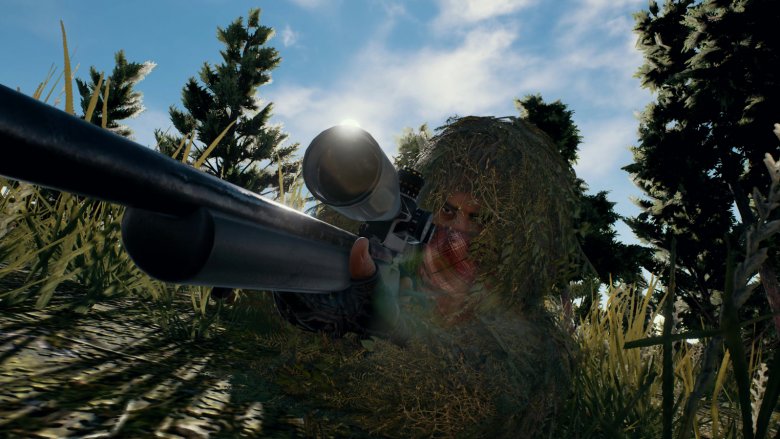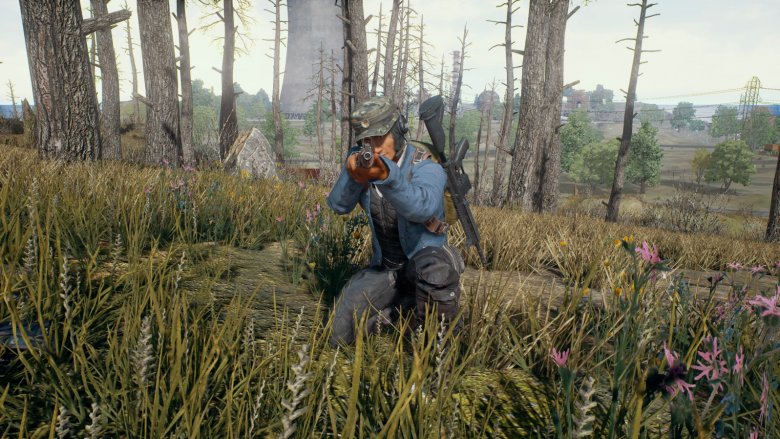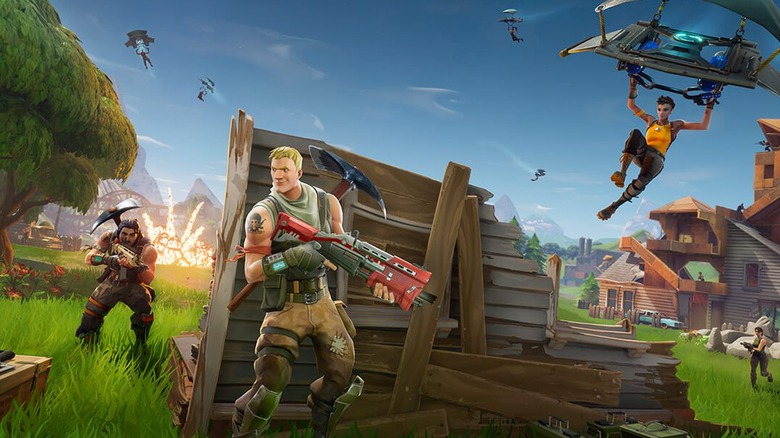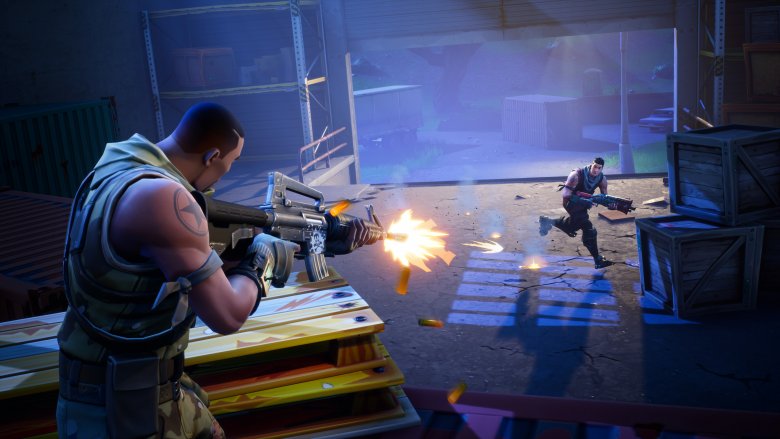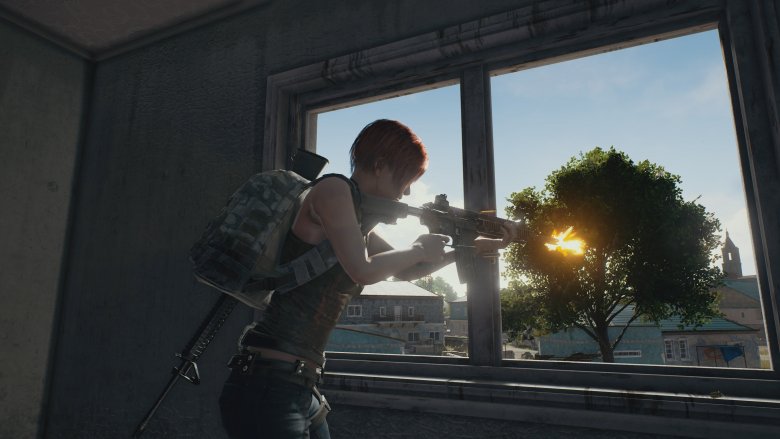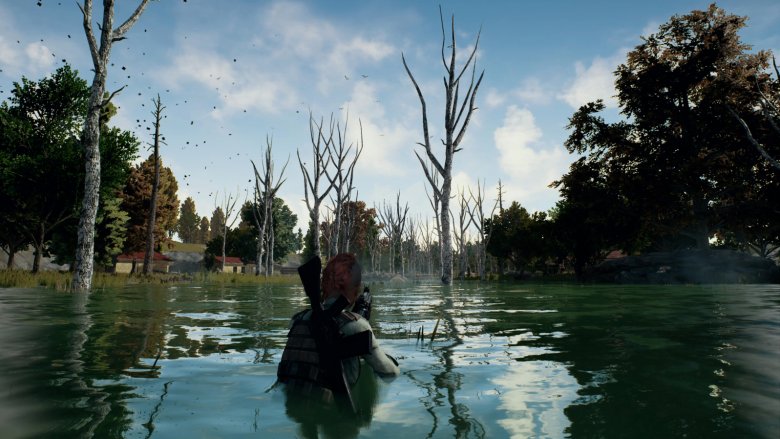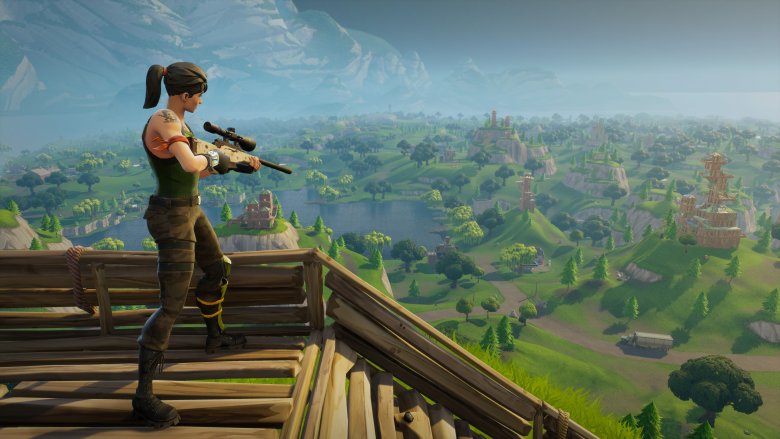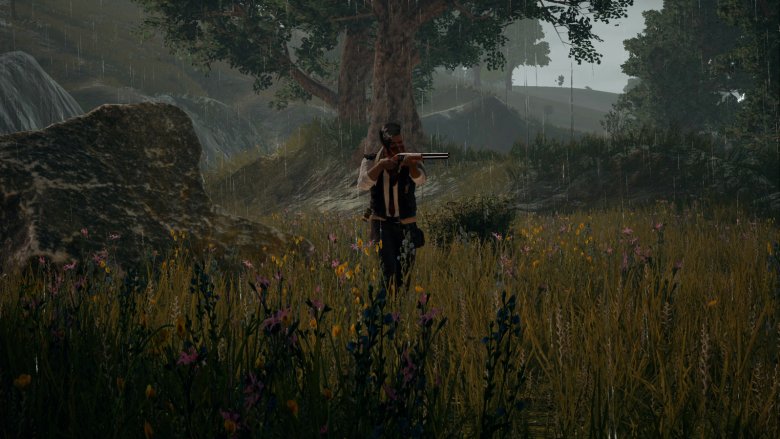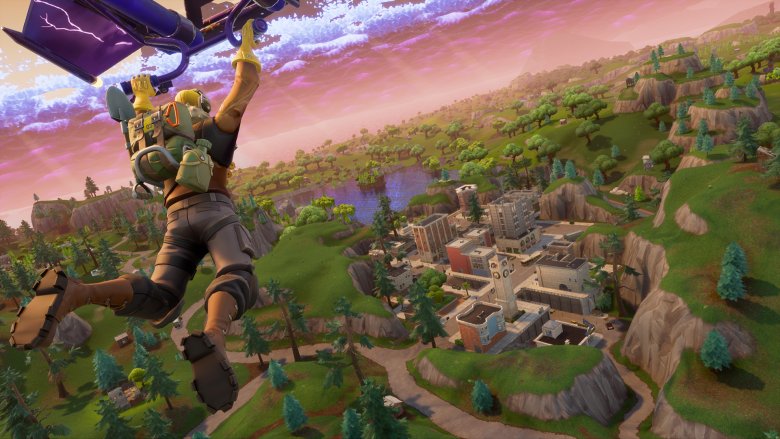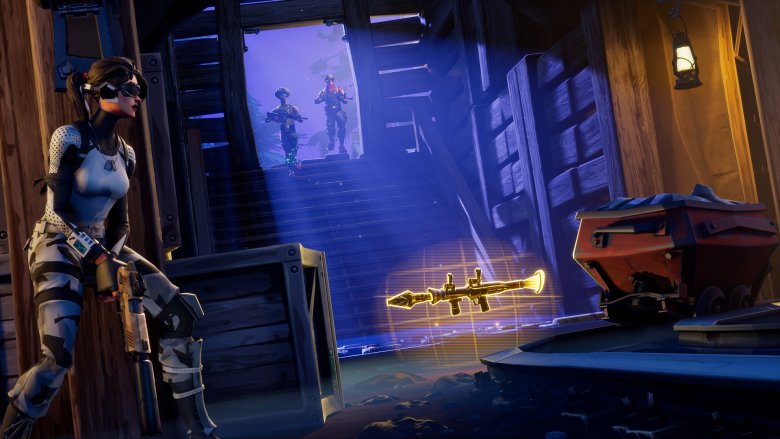The Real Reasons Battle Royale Games Are Dominating
A Japanese movie from the year 2000. An unknown modder. Put them together, and what do you get? Infinite money, apparently.
Battle Royale was a strange Japanese film in which a bunch of students are forced to fight and kill each other until there's only one left standing. Taking inspiration from this central idea and some already-existing mods based on the concept, modder Brendan Greene created a few games within the architecture of ARMA 3 and DayZ. Eventually, he would break out and create his own game from scratch, naming it after his gamertag: PlayerUnknown's Battlegrounds, or PUBG as it would come to be known.
And it exploded. Within a few short months, PUBG was the biggest game on the planet, shattering Steam concurrent-user records. Not long after, the inevitable copycats arrived, including Epic Game's Fortnite: Battle Royale, which usurped PUBG's throne and went on to become the biggest game in the world. It's safe to say that the battle royale genre has become the hottest topic in gaming.
But why? In a world flush with AAA studios pumping out reliable megafranchises, what made a little mod and its follow-ups such a phenomenon? From fortuitous timing to solid design decisions, there are a lot of good reasons why the battle royale genre now reigns supreme.
Call of Duty has ruled the roost for too long
Though the series got its start all the way back in 2003 (when World War II was still raging), Call of Duty conquered the industry in 2007 with its fourth iteration, Modern Warfare. Aside from bringing the action into a contemporary setting, Modern Warfare also introduced a number of RPG-style elements into its multiplayer: earned experience points, loot, and perks. Combined with the game's frenetic pace, this concoction blew gamers away and propelled CoD into the leading shooter series in the world.
Other games challenged CoD, most notably DICE's Battlefield series, but the basic outlines of these other games came to closely mirror CoD. How could they not? The sales numbers were there. Everybody wanted in on the action. And for ten long years, that has more or less been the state of the shooter scene.
But a decade is a long time to hold the throne, and gamers were ready for a new style. For one thing, a whole generation was coming up that had never known anything else, and was ready for the next spin on the genre. For another, audiences get bored when they see too much of the same thing. Like, say, World War II shooters back in the early 2000s. Call of Duty was the franchise that saw the WWII exhaustion coming, and changed course. But this time around, Call of Duty is the course that the market wanted to turn from.
Battle royale came at just the right time. It was the new direction everyone had been looking for.
It's cheap
Call of Duty, Battlefield, and their endless clones cost $60 each. If you can live with just the base game, that is. Oh, you want to play all those awesome maps with your friends? All combined, that'll be another $60, unless you dare to risk your wallet on a Season Pass for $50 instead. That's quite a lot of money. Oh, and by the way, you'll be doing that every single year, as new games in the series come out.
Enter battle royale, which by comparison, is dirt cheap. In fact, in the case of Fortnite, it's entirely free. The game that defined the genre, PlayerUnknown's Battlegrounds, is 'expensive' at only $30 (though it's free on mobile). Hey, is your friend on a new map? No additional charge. Brand-new content coming down the pipeline? No additional charge. Has it been another year? Not to worry: these developers will support the original game year after year, instead of releasing new titles to buy on an annual basis.
Of course, battle royale games are supported by microtransactions. But the same can be said of Call of Duty. So even assuming you found both CoD and PUBG equally engaging, one is just orders of magnitude more affordable. For a lot of gamers around the world, that alone is a huge draw.
It's on everything
Once upon a time, before Call of Duty even, it was Halo that ruled the shooter landscape. But even for all its well-deserved fame and influence, Halo was never going to be the biggest game in the world. Why? Because it was exclusive to Microsoft's Xbox platform. For Microsoft, that was a huge positive: Halo in many ways built the Xbox brand. But for sheer marketshare, exclusivity is always going to hold a title back.
But thus far, the biggest games of the battle royale craze have not been platform-exclusive. Rather, PUBG and Fortnite are on everything. And we do mean everything. For the first time ever, the biggest games in the world can be played on a phone if the player so chooses, a stunning snapshot of our modern world. Xbox? PlayStation? PC? Battle royale is on them all. And we're not talking about a vast ecosystem of competing games: PUBG and Fortnite can both be found on all these platforms. In Fortnite's case, you can even play with your friends across platforms.
Riot Games' League of Legends is often credited with bringing free-to-play to the AAA scene, and in return, it became the biggest game in the world. And it was limited to just PC and Mac. Battle royale casts a vastly wider net, and its potential seems limitless.
Tension meets simplicity
For the most part, shooters are about adrenaline. Run into a space, scan for enemies, and blast them before they blast you. Call of Duty rewards fast reflexes and twitch reactions. Halo is slower and more balletic, but still involves a lot of dashing around. By contrast, tactical shooters like the Rainbow Six and Counter-Strike series were always about tension. You've only got one life in these games, so you have to tread cautiously, and towards the end of a round, with an enemy that just has to be around that corner, your heart will be hammering in your chest. But a lot of tactical shooters are difficult to master, with complex features or a bewildering list of weapons to be purchased before a match begins.
Battle royale mixed the best of both worlds, by providing the pick-up-and-play simplicity of a traditional shooter with the white-knuckle tension of a tactical one. You don't need to memorize forty different features, and you don't need to buy from a huge inventory list: you just drop out of a plane (or a bus) and go. Simple as that. Yet for all that minimalism, the pure anxiety of turning around a corner — and running straight into another guy — can match anything Counter-Strike ever did. It's a devastatingly clever mix, and it works brilliantly.
It survived the survival genre
Over the last several years, a new genre has emerged onto the scene. The player is not a mighty warrior, but a weak, underpowered civilian. The player will have to scout the terrain, collect resources, craft gear, and eventually become a fearsome fighter. At the same time, he'll have to find food and water, and build a shelter. This became known as the survival genre, which included games like H1Z1 (now called Just Survive) and Ark: Survival Evolved.
The battle royale genre was born out of this budding genre. Brendan Greene, better known as the aforementioned PlayerUnknown, took his first crack at the battle royale style with a mod for DayZ, itself a pioneering survival game modded off of ARMA 2. While he discarded the sustenance elements, the general idea of beginning with nothing and then scrounging for weapons remained. Battle royale was recognizably an offshoot of the survival genre, while still being its own distinct idea.
That turned out to be to its advantage. As survival games grew more popular, they attracted more and more interest. But survival games are slow and tough, and more casual gamers wanted a way to try out the style without spending a huge amount of time. Battle royale was able to capitalize on that perfectly, and now it has far and away outgrown the genre it came from.
Winning seems doable for everyone
Winning a battle royale match is really, really simple: just don't die.
You don't need to score any points. You don't need to capture a flag. You don't even need to kill anybody. You could, technically, just sit in a corner and wind up the last person standing (or, in that case, sitting). Where other games only reward excellent reflexes and a deep command of strategy, battle royale's style is simple enough that anybody can understand it, and even have a shot at taking home a chicken dinner.
That alone is a draw for a massive number of people, from younger kids to casual gamers all the way up to the true hardcore crowd, who will still find that reflexes and strategy are rewarded, too. But here's the real genius: if you die, it doesn't feel like you were out of your league. If just feels like, if only you'd been a little stealthier, or a little bit faster, you would have survived, and maybe even gone all the way to number one! That incentivizes people to keep playing more rounds, where other games might simply drive players off with their difficulty.
It plays fast
Dota 2 matches can last for over an hour of real time (or, in subjective time, entire centuries). StarCraft II can be a 45-minute time-suck before your opponent rage quits and calls you a smurf. And a good old-fashioned narrative game can last for hundreds of hours. Who has the time anymore?
Battle royale was poised to capitalize on the ever-tightening time-crunch we're all feeling, because its rounds are fast. A long match of PUBG is only about half an hour; most rounds will be shorter, and that's all assuming you survive to taste that chicken dinner. Fortnite matches are even faster. Thus, even a good player can fit in multiple rounds of battle royale in the same time as a single Dota 2 match. Poorer players — who will be spending less time per round, since they're, you know, dying — might only spend ten minutes per round, or five, or even one if they're really unlucky. That's a lot of game that can be played in a very short span. Almost no other AAA experience can match that.
Its unique pace makes for great viewing in the era of streaming
As we've mentioned, Call of Duty and its brethren have a truly frenetic pace that never lets up. Just watching a match is a shot of adrenaline. But that pace never varies: it's always on full blast, all the time. Battle royale games, by contrast, have a nice ebb and flow to their rounds. You're just collecting gear at first; then, there's an enemy, and you're manically dancing and shooting; then the fight is over, and you can scrounge in peace for a while; then you're hunting a player who hasn't seen you, and the tension is back on.
That natural flow makes for excellent viewing, even for people who aren't playing. And guess what? We live in an era when watching gamers stream is immensely popular. YouTube hosts an endless amount of content to be watched at any time, and Twitch allows fans to engage with their favorite personalities in real-time. Combine a great presenter with a game that's fun to watch and brilliantly paced, and what do you get? A phenomenon. Battle royale games grew to dominate social video platforms with astonishing speed, and that huge viewership in turn inspired more people to pick the games up themselves.
You, your friends, and no randos
Alright: time to play some Call of Duty or Overwatch with your buddies. You all log in and party up. Then you hit the matchmaking. And then ... randos. Your team is filled with who knows who, random people who have nothing to do with you, won't team chat, and just rush off and die like lemmings in, well, Lemmings. The night is ruined, rage quitting happens, and then you repeat it all the next night.
But battle royale games feature smaller teams. Where Overwatch and Call of Duty each require six-person teams in their most popular modes, battle royale games won't even allow a team of more than four (except for limited-time events). Battle royale can also work fine with a duo, and shines as a solo experience. In other words: no randos required. While it is possible to matchmake with unknown players, that is an entirely optional experience. By yourself or with a buddy, you never have to see another lemming again.
Unless of course, you are one yourself.

